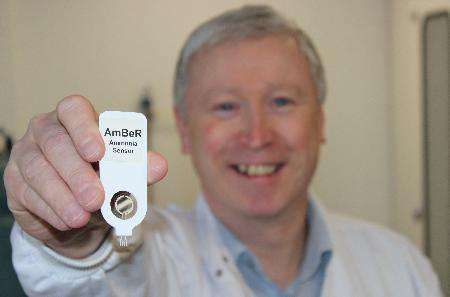New device could end blood test agony for thousands

Patients could be spared the unpleasant ordeal of having blood taken in future thanks to the work of a University of the West of England (UWE Bristol) academic who has devised a new breath testing device.
Professor Tony Killard has created a mass producible sensor which can detect ammonia levels in breath – a breakthrough which could eliminate the use of needles among thousands of patients.
Named AmBeR, the device could help patients with a number of chronic diseases and conditions who regularly need to check their ammonia levels through blood testing.
The technology will allow patients to test their ammonia levels painlessly with greater accuracy, on a more frequent basis and even while at home when a self-testing version of the device is developed.
Professor Killard, head of biomedical sciences at UWE Bristol, said: "Ammonia blood testing is inaccurate and ineffective. There are problems doing this with some conditions, especially where it involves children who have learning difficulties. With those types of patient, it is a major challenge.
"This will give clinicians a tool they don't currently have and it changes where and how often they can do the testing. You can do a test every day if necessary or you could do a test at home – it's quite transformative.
"No one has been able to do ammonia breath testing in a way which is accurate without using a large piece of equipment. There are instruments in existence which can do it but they are not economically viable. The AmBeR device will be more like glucose testing strips where you use the sensor test strip once and throw it away when finished. We are trying to make this a game-changer commercially."
Professor Killard, who has formed a company called BreathDX to market his innovation, has secured funding to explore the application of AmBeR in specific conditions. The device, which is smaller than a shoe box, is now in production and will go into clinical studies in May.
Professor Killard said he was 'humbled' when he realised the impact his work could have.
He said: "We went to some conferences and really saw the daily challenges people and their families with these conditions have. I was humbled by it. We had spent the whole time thinking about the scientific objective but then the human focus comes into sight and you start to think differently - about the value to other people.
"With the feedback we had, we realised how important it could be to them – that places a responsibility on you to deliver something for them."
Professor Killard came up with the idea for the device while investigating new sensor materials based on novel nanomaterials technology. He developed a new ammonia sensing material using polyaniline, a polymer which can conduct electricity. By forming it into nanoparticles, he discovered it was extremely sensitive and be could deposited in very thin layers only thousandths of a millimetre thick using low-cost printing technology.
Of his discovery, he said: "That was kind of the eureka moment. What we had was a cluster of new characteristics which allowed us to do new things we couldn't do before. Before, this material (polyaniline) was just a laboratory curiosity to scientists and you would play around with this stuff.
"Now we are looking at commercialising it, which has always been key to our activities - having a societal and economic impact."
Professor Killard said the technology could eventually be used to measure other trace breath gases for the non-invasive monitoring of further diseases, including potentially diabetes.
Provided by University of the West of England




















